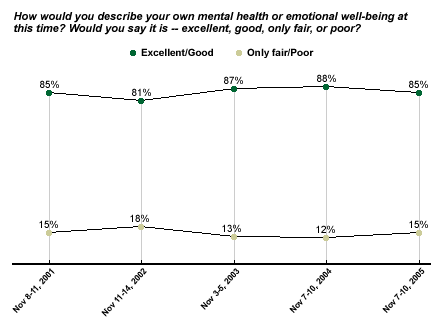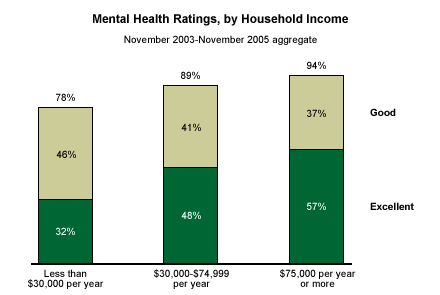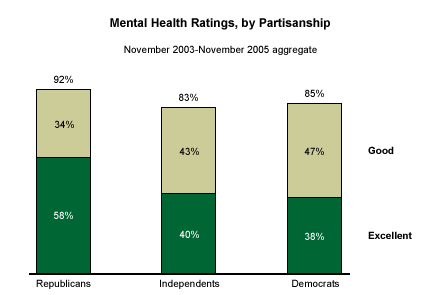Most Americans describe their mental health or emotional well-being positively, according to Gallup's annual Health and Healthcare poll. The poll also finds poor mental or emotional health affected Americans an average of three days in the past month, but, on average, it kept them from their typical activities only once. Household income is related to personal assessments of mental health, with lower-income Americans less likely to describe their mental health positively.
The poll, conducted Nov. 7-10*, finds that more than 8 in 10 Americans describe their mental health as "excellent" (42%) or "good" (43%), while fewer than one in six describe it as "only fair" (13%) or "poor" (2%). These results have fluctuated only modestly since Gallup first asked this question in 2001, ranging from a low of 81% to a high of 88%.

On average, Americans say that in the last month, they experienced three days in which their mental health or emotional well-being was not good. This includes 60% of Americans who didn't experience any bad days, 18% who had up to four poor mental health days, and 20% who had five or more days.
While they report an average of three poor mental health days in the past month, Americans only averaged one day in which their poor mental health or emotional well-being kept them from doing their usual activities, such as self-care, work, or recreation. Six percent had up to four such days, and 9% had five or more days like this. The vast majority -- 83% -- say poor mental or emotional health did not keep them from their normal routines any day in the last month.
Among the smaller group of respondents who say they experienced poor mental health in the past month, the average number of days in which their mental health prevented them from doing their normal activities was three days.
Is There a Mind-Money Connection?
The vast majority of all adults describe their mental health positively, but there are some variations in mental health ratings by household income and partisanship. To examine these variations more closely, Gallup combined the results of its last three surveys that asked this question, from November 2003 through November 2005.
Americans residing in households earning $75,000 or more per year are more likely to describe their mental health positively than are those living in households with lower annual incomes. Roughly three in four adults earning less than $30,000 per year describe their mental health as excellent or good. This compares with 89% of those earning between $30,000 and $75,000 per year and 94% of those earning $75,000 or more per year.

As the graph illustrates, there are vast differences by household income among those who describe their mental health as excellent. Only a third of those earning less than $30,000 per year describe their mental health in the most positive terms, while 48% of those earning between $30,000 and $75,000 and 57% of those earning $75,000 or more describe it this way.
The data also show that Americans earning $75,000 or more per year experience fewer days of poor mental health per month. On average, those earning less than $30,000 per year experienced five days of poor mental health in the past month. Among those earning between $30,000 and $75,000 per year, the average number of days is three per month, and among those earning $75,000 or more per year, it's one day per month.
Partisanship and Mental Health Ratings
Gallup's aggregate data also show that partisanship is related to ratings of one's mental health or emotional well-being, with Republicans slightly more positive than Democrats in their overall evaluations. Overall, 92% of Republicans describe their mental health positively, including a majority who say it is excellent. Eighty-five percent of Democrats describe their mental health in this way, with only 38% of Democrats saying their mental health is excellent.

Republicans also say they experience fewer days of poor mental health each month than do independents or Democrats. Republicans suffer poor mental health an average of two days per month, compared with three days among both independents and Democrats.
*Results are based on telephone interviews with 1,011 national adults, aged 18 and older, conducted Nov. 7-10, 2005. For results based on the total sample of national adults, one can say with 95% confidence that the maximum margin of sampling error is ±3 percentage points.
For results based on the sample of 350 adults who experienced at least one day of poor mental health in the past month, the maximum margin of sampling error is ±6 percentage points.
Results are based on telephone interviews with 3,027 national adults, aged 18 and older, conducted across three polls from November 2003 through November 2005. For results based on the total sample of national adults, one can say with 95% confidence that the maximum margin of sampling error is ±2 percentage points.
In addition to sampling error, question wording and practical difficulties in conducting surveys can introduce error or bias into the findings of public opinion polls.